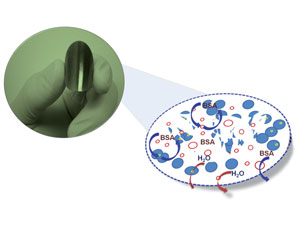There is usually a trade-off between selectivity and liquid permeability when making an ultrafiltration membrane but new research from scientists in the US suggests this doesn’t have to be the case.
Membrane technology is the preferred approach to many industrial, environmental, analytical and biomedical separations. Drinking water purification, wastewater treatment, haemodialysis and fuel cells are just a few examples of situations where membranes are central to filtration processes.
When designing a membrane to filter proteins from a liquid the aim is to increase the permeability of the membrane and to reduce the energy and time needed to achieve separation without forfeiting the selectivity of the membrane. Another goal is to eliminate the need to clean or replace the membrane by finding a way to prevent proteins from blocking the membrane’s pores and hindering its permeability.
Read the full article by William Bergius in Chemistry World
Highly dispersible polypyrrole nanospheres for advanced nanocomposite ultrafiltration membranes
Yaozu Liao, Thomas P. Farrell, Gregory R. Guillen, Minghua Li, James A. T. Temple, Xin-Gui Li, Eric M. V. Hoek and Richard B. Kaner
Mater. Horiz., 2014, Advance Article
DOI: 10.1039/C3MH00049D
Yaozu Liao, Thomas P. Farrell, Gregory R. Guillen, Minghua Li, James A. T. Temple, Xin-Gui Li, Eric M. V. Hoek and Richard B. Kaner
Mater. Horiz., 2014, Advance Article
DOI: 10.1039/C3MH00049D











